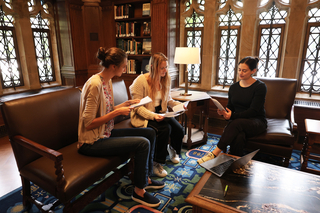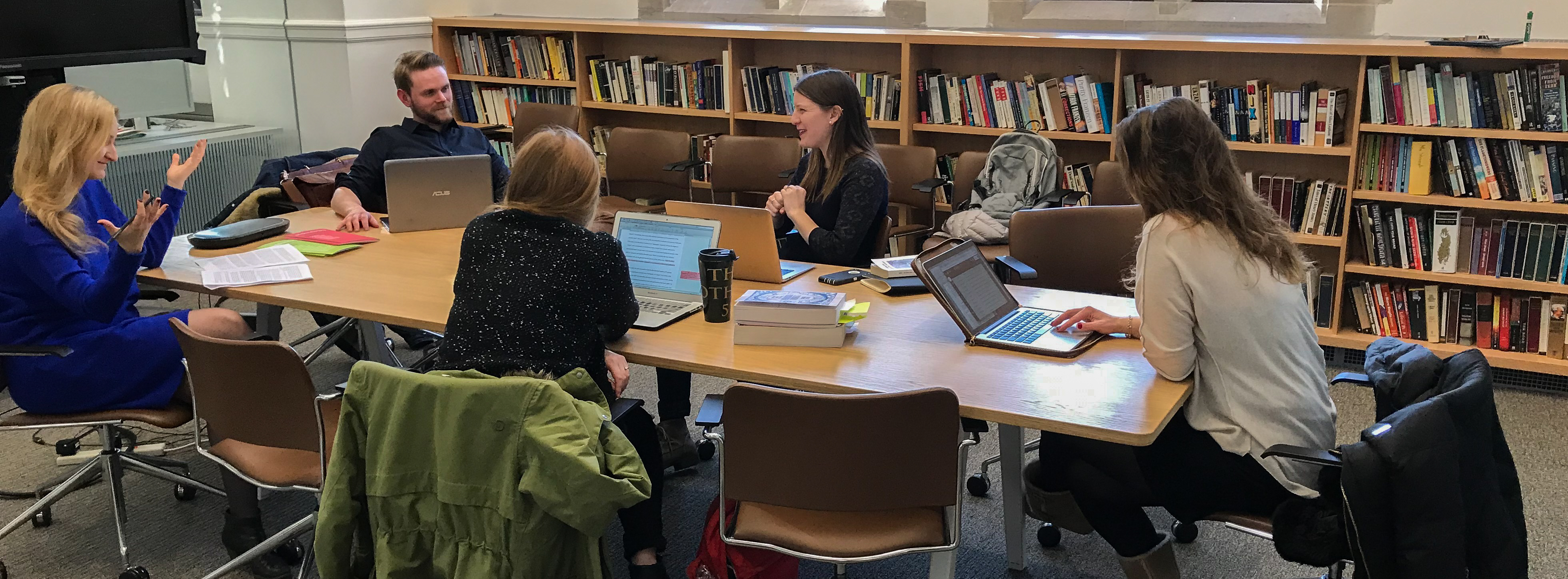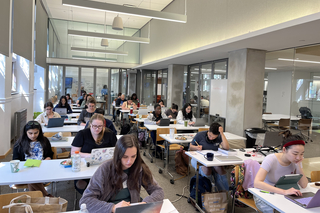Peer-review groups provide a supportive, collegial environment to share work in progress and receive feedback at any stage of writing. Joining a peer-review group can boost your progress by providing structure and motivation for your writing. In this small community of other writers, you’ll learn from the writing strategies of your peers and draw on their responses to improve the clarity and nuance of your work.
The GWL offers peer-review groups for prospectus writers, STEM fellowship applicants, and dissertation writers in the humanities and social sciences. We also offer discipline-specific groups for Law School and Divinity School students. If you’re working on a different project, you can get a similar level of support and accountability by scheduling a recurring 1-on-1 consultation with a GWL Fellow.
-
Building Community
in 2023–24
-
52
semester-long peer-review groups offered
-
160
graduate students participated
-
100%
of respondents improved their productivity and writing quality
How to Join a Peer-Review Group
Peer-review groups typically form during the first few weeks of each semester and meet weekly throughout the term. Groups that would like to continue meeting may typically carry over to the following term—possibly with a few changes in membership. Groups are advertised through the Graduate Writing Lab newsletter sent to all registered GSAS students. You may also email grad.writing@yale.edu for more information.
What to Expect
4- to 7-member groups are facilitated by the Graduate Writing Lab Fellows, who organize and plan meetings, create the schedule of presentations, monitor attendance, and guide the discussion. At the first meeting, group members discuss their goals for the group, set a schedule, and agree on a way of working together that aligns with the goals of each participant.
At each weekly meeting, two or three members present written work for detailed feedback. The members of the group have reciprocal obligations—you give me feedback this week, and I will respond to your paper next week.
In addition to improving group members’ writing, we strive to create a culture of trust and mutual support within peer-review groups by requesting, giving, and receiving feedback clearly and supportively—skills group members can apply in any future writing process.
Dissertation Groups
These small communities of dissertation writers meet weekly to exchange feedback, make steady progress, and support one another. Groups are available for students writing both humanities and social science dissertations, with additional groups for students writing on topics related to race, indigeneity, and transnational migration (RITM). They start at the beginning of each term, and often continue into subsequent semesters.
Fellowship Groups
These groups help students craft and polish fellowship applications that communicate the impacts of their research and their promise as a scholar. Groups writing for the NSF GRFP run both during the summer and in the early fall. NIH F30/31 groups begin 8–10 weeks before the December, April, and August deadlines. Facilitated by fellowship awardees, these groups can help you navigate unfamiliar genres like the biosketch and research proposal and manage the logistics of a complex application.
Prospectus Groups
These groups help each participant develop a solid foundation for their dissertation by writing a strong prospectus and submitting it on schedule. Led by GWL Fellows at the dissertation stage, groups in the humanities, social sciences, and STEM meet weekly to set goals, exchange feedback, and navigate this challenging genre together. Groups start early in term and meet until the submission deadline. They sometimes transition into dissertation groups as the participants become ABD.
My group leader set a great example for how to give comments and encouraging students in the challenge of writing. She set the tone for the productivity and positivity of the group.
Fellowship Group Participant, spring 2024
Groups for Law School Students
We offer groups for both JD students working on their SAW papers and JSD students writing dissertations. In SAW groups, 2L and 3L students support one another through the completion of their papers. They meet for an hour each week beginning in October and continuing into the spring semester. JSD groups follow a similar schedule, with participants supporting one another through timely completion of their dissertations.

Groups for Divinity Students
These small groups of YDS students working on their theses meet for one hour each week. They begin in October and continue into the spring semester. Participants share progress on their weekly goals at the start of each meeting. Then, one writer presents a draft for feedback from the group. Together participants strive to create a community of writers supporting each other toward successful and timely completion of their theses.
Benefits of Joining a Peer-Review Group
In addition to the helpful feedback you receive on your work in progress, peer-review groups offer a sense of community to energize your writing and provide emotional support when you need it. The diverse specialties of the group members foster innovative thinking and can broaden your sense of the scope and impact of your research.
Peer-review groups are built around enhancing your productivity and keeping you on track with your project. Near-term goal setting is closely linked to motivation, and peer-review groups offer a structured space to set writing goals and hold yourself accountable to those goals through regular check-ins.
In contrast to an academic setting that can feel impersonal and anonymous, group members become colleagues you can turn to for the kind of advice, encouragement, and sympathy that can only be given by scholars undertaking an ambitious writing project similar to yours.
Still Have Questions?
For additional information about Graduate Writing Lab peer-review groups, contact GWL Director Ryan Wepler or email grad.writing@yale.edu.
Explore GWL Programs
-
Writing Consultations
Get 1-on-1 feedback at any stage of the writing process—from brainstorming to final edits.
-
Workshops & Panels
Interactive opportunities to grow your academic writing knowledge or expand your toolkit of skills.
-
Writing Retreats & All Writes
Full-day and half-day events where graduate students set goals and write as a community in a quiet, supportive space.
-
Public Speaking Studio
Practice your lecture, pitch, or presentation and receive feedback on nine aspects of your delivery.
We’re here to help!
Reach out to the Poorvu Center team if you have any questions or to learn more about our programs.



